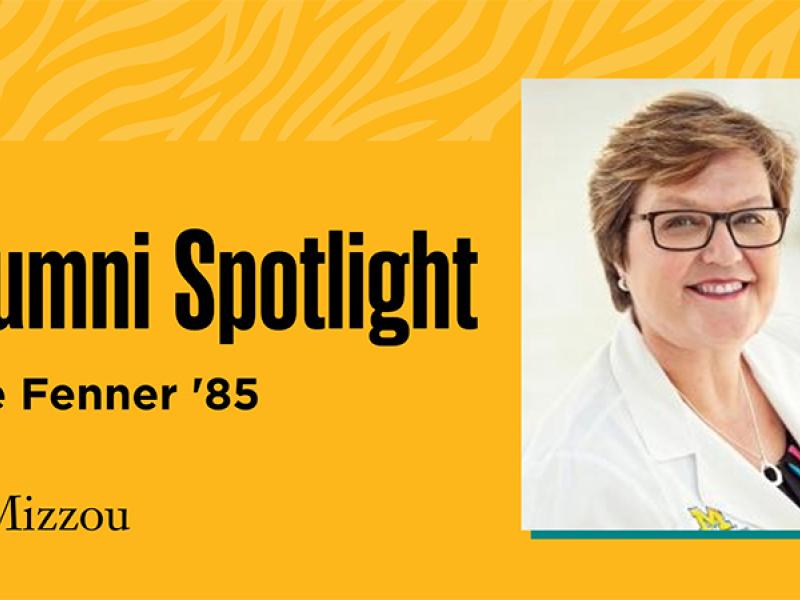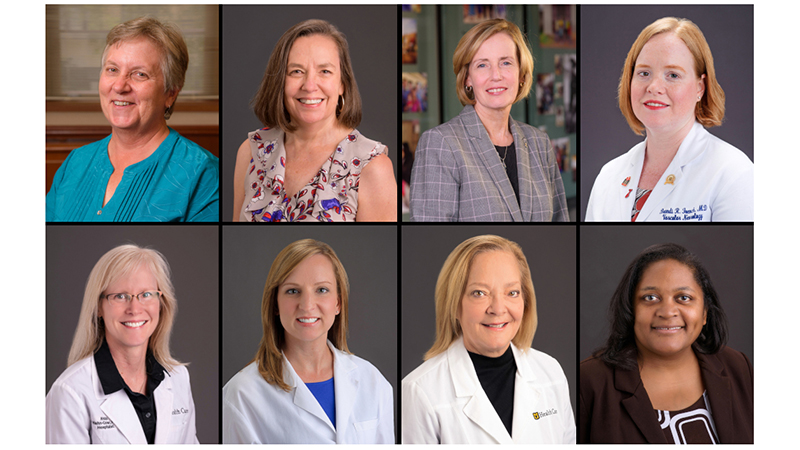
Women have always played a role in health care, with records of female surgeons, doctors and midwifes dating back to ancient times. While the medical field has historically been male-dominated, women today account for 37% of active physicians and half of all medical students in the United States.
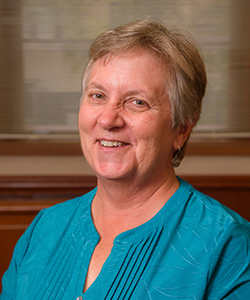
In the MU School of Medicine, the newest group of students is 64% female – nearly two-thirds of their class of 2027. Betsy Garrett, MD, MSPH and professor emerita, says this wasn’t the case when she attended medical school at MU.
“I started medical school in 1975, and there were just so few women role models,” Garrett said. “There were maybe six or seven women faculty out of a several hundred. That made a difference, because you didn't see role models of women doing what you thought you wanted to do.”
Garrett’s graduating class was 20% women, the beginnings of an upward trend. She later pursued family medicine, wanting to care for all members of a family with a desire to form long-term relationships with her patients.
She later served as the president of the Missouri Academy of Family Physicians, the president of the Society of Teachers of Family Medicine and its foundation, and was chair of the American Board of Family Medicine.
“There are many women faculty, many women chairs and many women in positions of power, which just clearly did not exist then,” Garrett said.
They do now. Read about our female leaders below.
Lee-Ann Allen, PhD, Former Chair of the Department of Molecular Microbiology & Immunology
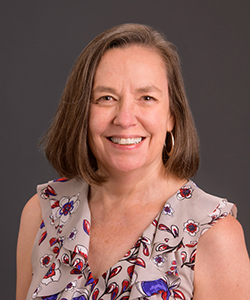
Lee-Ann Allen, PhD, former Chair of the Department of Molecular Microbiology and Immunology, thought she wanted to be a doctor growing up. When she started college, she enrolled in the pre-medicine track, citing her love for science. As she studied more, Allen became less and less certain she wanted to take care of patients and switched her major to biochemistry.
The biochemistry major required Allen to do undergraduate research, and it was love at first lab. She trained first as a lipid biochemist, but while completing her postdoctoral training she developed an interest in her current line of research. It focuses on the mechanisms of the body’s immune system.
“I like being clinically adjacent,” Allen said. “I study human cells and human infectious diseases and have always benefitted from close interactions with clinicians, even though I’m not directly involved in patient care.”
For Allen, being a female scientist never felt like an obstacle. She says microbiology and the innate immunity field has “always been a very welcoming community.” Allen hopes she can continue to be a mentor figure to students and new faculty.
“When I was a trainee, it was not common to see women in leadership roles, like senior professors, department chairs or as presidents of scientific societies,” Allen said. “The situation has changed a lot, and it is really important to me to be that role model for the next generation.”
Talissa Altes, MD, Chair of Radiology
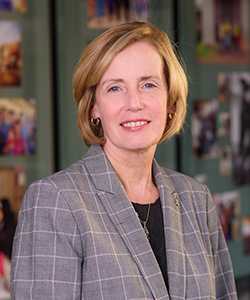
While Allen pursued medicine from an early age, Talissa Altes, MD, Chair of Radiology hadn’t even considered medicine in college. She doesn’t describe her young self as someone who had her life plans figured out in kindergarten. She earned her bachelor’s and master’s degrees in electrical engineering, following in the footsteps of her father.
Altes would go on to work in several high-tech companies, helping to build things like low-orbit satellite systems. As a young professional, she always made time to volunteer and found herself drawn to medical-related opportunities. A physician once remarked that she’d make a great doctor, which Altes dismissed, saying she was happy with her career. Until her epiphany.
“I was living in San Diego, working for Qualcomm as an electrical engineer,” Altes said. “I was biking down this hill in Rancho Santa Fe, and I was just envisioning what my life would have been like as a doctor. It was a joyful feeling, when I suddenly had the epiphany – ‘Well, you’re going to turn 40, whether you’re an electrical engineer or a doctor, so why not turn 40 as a doctor?’”
The path to medicine is long and sometimes difficult. While she got a relatively later start, Altes feels her life experience in another profession prior to entering medicine was tremendously valuable.
“What medicine gave me was that larger sense of purpose. It’s important to me, on a day-to-day basis, to be making the world better for somebody,” Altes said. “As a radiologist, my job is to look at the images (from scans) and figure out what is going on. I feel very lucky to be a radiologist at MU and love every minute of it.”
Brandi French, MD, Chair of Neurology
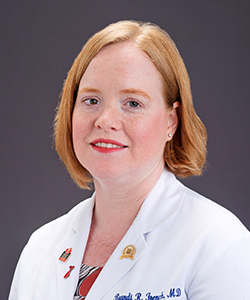
Brandi French, MD, Chair of Neurology knew she wanted to go into science as a child but didn’t know which field to pursue. She explored engineering, geology and archeology, but decided to go into medicine because she could “do something helpful in a tangible way” and have continuous access to learning opportunities.
While in medical school, neurology was her favorite rotation. She remembers enjoying the exercises where she had to match what regions of the brain caused specific symptoms. The brain was a puzzle she loved to solve.
The importance of neurology wasn’t fully solidified for French, though, until her grandfather suffered a ruptured aneurysm. It was only a day or two after the rotation finished.
“Going through that experience made me very keenly aware of the types of things that neurologists, and particularly stroke neurologists do. The types of wonderful saves that we can make, and then also the opportunity to help people through the grieving and death and dying process,” French said. “Neurology just wrapped it up in such a way that it was very interesting, and it felt very poignant.”
When French entered the field, vascular neurology was very much dominated by men. She could either let their “probably meaningless” comments get under her skin or pursue being a great neurologist.
“I grew up in a family where you put your hard hat on and you moved through things,” French said. “I think I just learned that I wasn’t going to accept that type of behavior, and I wasn’t going to internalize it and take it personally, and I wasn’t going to let it hold me back.”
Jean Ricci Goodman, MD, MBA, William T. and Roberta Ann Griffin Endowed Chair in Obstetrics and Gynecology
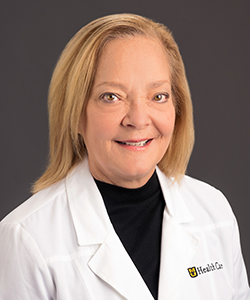
Jean Goodman, MD, MBA the William T. and Roberta Ann Griffin Endowed Chair in Obstetrics and Gynecology, grew up surrounded by medicine. Her mother was a nurse, her dad a urologist and her older brother had frequent hospital treatments. That exposure, plus her gravitation toward providing service, made it a perfect fit for her career.
She originally planned to follow in her father’s footsteps, but Goodman quickly changed her mind after her rotation in Obstetrics and Gynecology.
“The first night I was on (rotation), I was allowed to deliver a baby, and I was hooked,” Goodman said.
Goodman sub-specialized in Maternal-Fetal medicine, and in addition to providing clinical care to those with high-risk pregnancy, her research involves diabetes, infectious disease and epidemiology and how they relate to pregnancy and pregnancy outcomes.
She credits her success to the multiple mentors she found throughout her education and career and emphasizes how influential they can be – it can be the reason someone enters or leaves a field.
“It’s amazing what mentors can do for us, so I tell my faculty and my residents how important it is to set positive examples for our students,” Goodman said.
While she doesn’t think her gender identity has impacted her experience in medicine, she does believe women are expected to juggle more responsibilities, like childcare and taking care of the house. She stresses how important it is to ask for help when needed.
Kristin Hahn-Cover, MD, Former Chair of the Department of Medicine
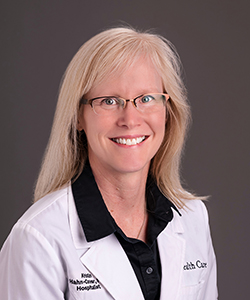
Kristin Hahn-Cover, MD, former Chair of the Department of Medicine, was always interested in science and working with people. Math had been her best subject in school, though, and chose the subject as her major when entering college. She realized something wasn’t adding up when she took biology, a required class, and fell back in love with it. That, combined with how much she enjoyed volunteering as a peer counselor at her college’s student health center, made Hahn-Cover decide to pivot her career.
“I wanted a job and a career that lets me contribute to peoples’ lives, and how better to do that than be in health care?” Hahn-Cover said.
After completing medical school, Hahn-Cover spent her residency in internal medicine, aiming to become a general internist. She worked as a primary care physician in her first job, but an internist practices in both the inpatient and outpatient settings. So, she switched to working in the hospital and inpatient services.
“Part of the privilege of being a hospitalist is offering comfort, compassion and hope, a plan for people, and also sitting with them in their suffering,” Hahn-Cover said.
Hahn-Cover has always believed her empathy and ability to map out a plan, two strengths of hers, comes from her identity and lived experiences as a woman.
“For me, being a woman has been an integrated part of my being a physician and an internist, and how I provide care,” Hahn-Cover said.
Laura Hesemann, MD, Chair of the Department of Pediatrics
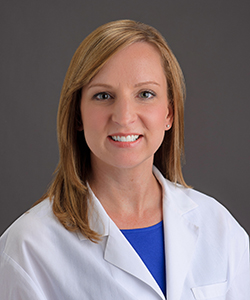
Laura Hesemann, MD, Chair of the Department of Pediatrics, is also a lover of science and enjoys working with people as well. Medicine seemed like the right combination of those interests, and a way to serve others and follow her father’s guidance.
“My dad especially encouraged my siblings and I to think about how we could use our gifts, our natural talents and our skills for the good of other people,” Hesemann said.
Pediatrics is a common specialty for female physicians, with 65% of pediatric physicians being women, but it doesn’t mean the barriers have been broken down.
“I do believe women have more biases that we’re up against. I personally have really benefitted from some really strong advocates and allies who would recognize where I was ‘at risk’ as a woman,” Hesemann said. “For example, when I was having my first baby, I was lucky enough to work with people who supported me in breastfeeding before it was mandated or the norm.”
There hasn’t been a day where Hesemann’s regretted medicine or her path within it, despite the challenges of pediatric care.
“People will sometimes say things like, ‘It’s so heartbreaking to see kids with disease. How can you go to work every day and see that?’” Hesemann said. “And it is sad, it’s true. It feels very unfair that kids have diseases, but my response to that every time is, yeah, but how can you see a kid suffering and not want to jump right in and help?”
Laine Young-Walker, MD, Chair of the Department of Psychiatry
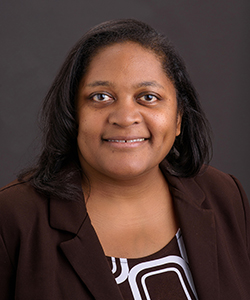
For Laine Young-Walker, MD, Chair of the Department of Psychiatry, she didn’t have any role models of medical professionals, except if you count her brother also wanting to be a doctor. She simply decided as a seven or eight-year-old that she would be a doctor, and sought out the appropriate resources. She came to the University of Missouri in 1989 for undergrad and has stayed since.
Originally, Young-Walker was determined to specialize in obstetrics and gynecology. Although she minored in psychology, she hadn’t had any exposure to mental health care and psychiatry until her first rotation. She fell in love.
“I liked delivering babies, I liked women’s health care, but I didn’t like the surgical part,” Young-Walker said. “The field of human development and psychological functioning was something I was interested in, and it was something I was able to delve into.”
As a Black woman, Young-Walker says her identity is not something that can be hidden, and there will always be people who will make automatic assumptions about her. The key is to push forward regardless of what others think or say – and don’t be afraid to ask for help, and don’t be proud enough to reject the support of other people.
“What I strive to do is show people myself as a person, and my work ethic, my drive and my determination,” Young-Walker said. “It doesn’t matter whether I’m a woman, or Black, or whatever. I’m going to do the work, and it’s going to be stellar.”



